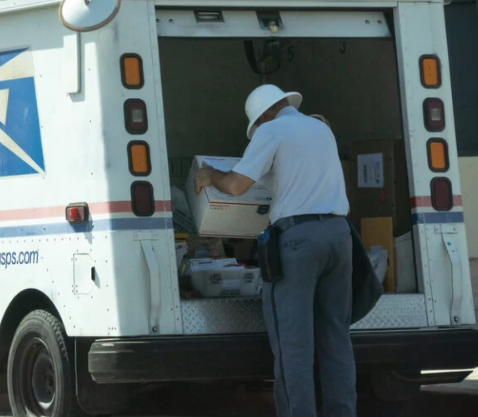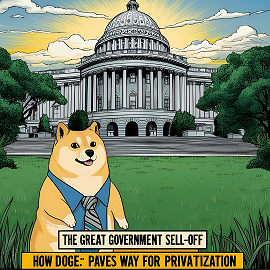The Great Government Sell-Off: How DOGE Paves Way for Privatization
By Publius
March 31, 2025

WASHINGTON — The Department of Government Efficiency, known widely as DOGE, is systematically dismantling federal agencies and creating opportunities for private companies to take over government services, according to internal documents and interviews with current and former officials.
The initiative, led by billionaire Elon Musk until his recent departure, has already targeted dozens of agencies, with particular focus on the Transportation Security Administration, U.S. Postal Service, and various regulatory bodies. Critics argue the effort represents the largest transfer of public assets to private hands in American history.
“This is not about efficiency,” said a senior civil servant who requested anonymity for fear of retaliation. “It’s about funneling tax dollars into private companies that will charge more for less service while paying workers lower wages and stripping away protections.”
The privatization push follows a pattern laid out in Project 2025, the conservative blueprint for restructuring government that gained attention during the presidential campaign. While administration officials have publicly distanced themselves from that document, DOGE’s actions align closely with its recommendations for shifting government functions to the private sector.
The TSA Example
Among the most controversial targets is the Transportation Security Administration. Created after the September 11 attacks to replace private airport security contractors, the TSA employs approximately 50,000 people nationwide. Now, it faces potential dismantling in favor of private security firms.
“We once had private security in airports,” noted a commenter on Reddit who identified as a military veteran. “I could swear there was a catalyst to making it an inherently governmental function.”
Current TSA employees express alarm at the prospect. “If they privatize, travelers will still go through security, but instead of trained, accountable professionals, they’ll be dealing with private contractors cutting corners to maximize profits,” said an employee who identified themselves as a transportation security officer.
The officer noted that TSA intercepted over 6,700 firearms in 2023 alone, most of them loaded, contradicting the notion that the agency performs mere “security theater.”
A Broader Pattern
The privatization strategy extends well beyond airport security. According to federal employees across multiple agencies, DOGE has ordered comprehensive reviews of government functions to determine which could be performed by private contractors.
“My agency had a data call for all agreements, asking how many employees work on the project and if it could be completed by private industry,” reported one federal worker who requested anonymity.
Former government efficiency experts point to previous attempts at privatization that yielded mixed results. During the George W. Bush administration, a government-wide effort to outsource services ultimately concluded that federal workers performed most functions more cost-effectively than private contractors.

“History is repeating itself, but with less careful analysis,” said Dr. Eleanor Simmons, a public administration professor at Georgetown University. “The difference now is the speed and scale of the changes, with little evaluation of long-term consequences.”
Rural America at Risk
Particular concern centers on the U.S. Postal Service, which delivers mail to every address in America regardless of profitability. Critics of privatization warn that rural communities would likely see service reductions or eliminations under a profit-driven model.
“If this privatization happens to the Post Office, they’ll cut out many rural delivery routes,” predicted a policy analyst familiar with postal operations. “Companies will argue: ‘What do you want us to do? We lose money on those routes.’ That’s precisely why these services are public.”
Beyond mail delivery, experts warn that privatized services could impact everything from weather forecasting to food safety inspections, with potential consequences for public health and safety.
The Economic Equation
Proponents of privatization argue that market competition drives efficiency and innovation. However, critics counter that government contracts often create de facto monopolies once awarded.
“One inherent problem with government contracts is that once the contract is awarded, there is basically no competition for future contracts,” explained a procurement specialist with experience in both public and private sectors.
The specialist described a common pattern: initial competitive bidding followed by steadily increasing costs as equipment ages and trained employees leave for better opportunities. Meanwhile, new competitors struggle to enter the market without the incumbent’s infrastructure and trained workforce.
Political Divisions
The privatization push has exposed deep political divisions. Republican lawmakers have largely supported the DOGE initiative, viewing it as consistent with decades of conservative advocacy for smaller government.
Democratic opposition has been vocal but ineffective in stopping the changes. Some progressives have called for future administrations to renationalize privatized services, potentially without compensation to companies that benefit from the current transfers.
“Any candidate running for office should have a plank in their platform that any public service privatized as a result of DOGE will be immediately renationalized with no compensation,” suggested one political strategist on social media, reflecting growing sentiment among government workers.
Looking Ahead
As DOGE continues its work, questions remain about the long-term viability of privatized government services and the potential for reversing these changes in the future.
Legal experts note that there are established procedures for privatizing government functions, including OMB Circular No. A-76 and Federal Acquisition Regulations that define “inherently governmental” activities that should not be outsourced.
“The administration appears to be circumventing these established processes,” said Jonathan Keller, a former federal contracting officer. “That raises questions about the legal durability of these changes.”
For now, the transformation continues at unprecedented speed, reshaping the relationship between citizens and their government in ways that may persist long after the current administration ends.
Responses